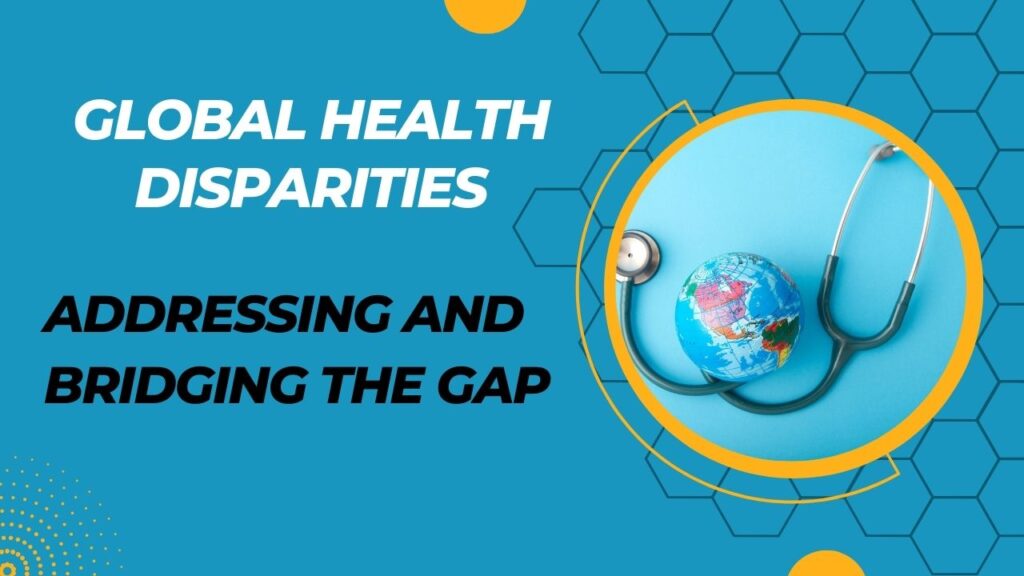Global Health Disparities represent a significant challenge, requiring concerted efforts from governments, organizations, and individuals worldwide to address them.


Understanding Global Health Disparities:
Global health disparities encompass differences in health outcomes, healthcare access, and healthcare quality across countries and within populations. While some regions boast advanced healthcare systems and high life expectancies, others struggle with inadequate infrastructure, limited resources, and high rates of preventable diseases.
Factors Contributing to Disparities:
1. Economic Inequities: Economic disparities play a central role in shaping health outcomes. Low-income countries often face challenges in funding healthcare infrastructure, leading to insufficient healthcare facilities, shortages of medical supplies, and understaffed hospitals.
2. Access to Healthcare: Disparities in healthcare access arise from various factors, including geographic location, socioeconomic status, and cultural barriers. Rural and remote areas, in particular, face challenges in accessing healthcare services due to distance, transportation barriers, and a shortage of healthcare providers.
3. Health Education and Awareness: Disparities in health education and awareness contribute to differences in health behaviors and outcomes. Lack of knowledge about preventive measures, such as vaccination and hygiene practices, can exacerbate the spread of diseases and lead to poorer health outcomes.
4. Political and Social Determinants: Political instability, conflict, and social unrest can disrupt healthcare systems and exacerbate health disparities. Additionally, factors such as gender inequality, discrimination, and marginalization can further limit access to healthcare services for vulnerable populations.
Impact of Global Health Disparities:
The consequences of global health disparities are profound and far-reaching, affecting individuals, communities, and economies:
– Higher mortality rates: Populations in countries with limited healthcare access experience higher rates of preventable deaths from diseases such as malaria, tuberculosis, and HIV/AIDS.
– Reduced life expectancy: Disparities in healthcare access contribute to significant variations in life expectancy between countries, with individuals in low-income countries often living shorter lives compared to those in high-income countries.
– Economic burden: Health disparities impede economic development by reducing productivity, increasing healthcare costs, and perpetuating cycles of poverty and illness.
Addressing Global Health Disparities:
1. Strengthening Healthcare Systems: Investing in healthcare infrastructure, training healthcare workers, and expanding access to essential medicines and technologies are crucial steps in bridging the gap in healthcare access and quality between countries.
2. Promoting Health Equity: Implementing policies that address social determinants of health, such as poverty, education, and gender inequality, can help reduce disparities and promote health equity.
3. Global Health Partnerships: Collaborative efforts between governments, international organizations, and non-governmental organizations are essential for tackling global health challenges. Initiatives such as the World Health Organization’s (WHO) Universal Health Coverage campaign aim to ensure that everyone can access the healthcare services they need without facing financial hardship.
4. Empowering Communities: Empowering communities through health education, community-based interventions, and participatory approaches can strengthen healthcare systems and improve health outcomes at the local level.
Conclusion:
Global health disparities remain a pressing challenge, with millions of people worldwide facing barriers to accessing quality healthcare. Addressing these disparities requires a multifaceted approach that addresses underlying social, economic, and political factors while promoting equity and empowerment at the individual and community levels. By working together to tackle global health inequalities, we can move closer to achieving the vision of health for all, regardless of nationality or socioeconomic status.


Dr. Vivek Kumar Jha
Prof. and H.O.D
Department of Audiology and Speech Language Pathology
Faculty of Allied Health Sciences,
Shree Guru Gobind Singh Tricentenary University,
Gurugram, Haryana.











